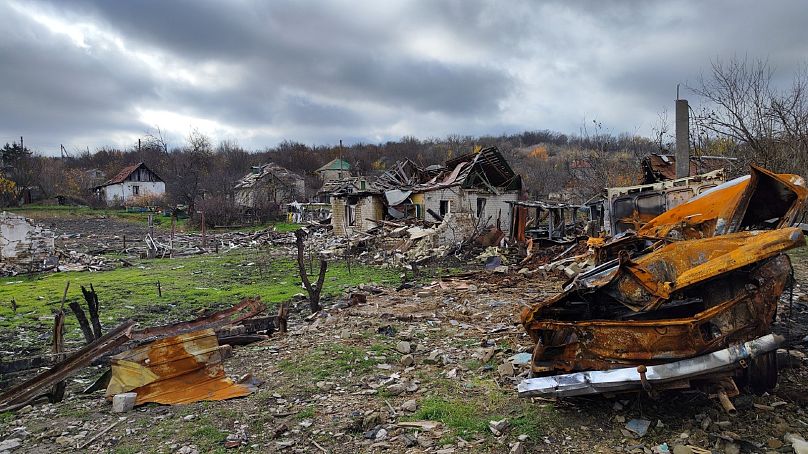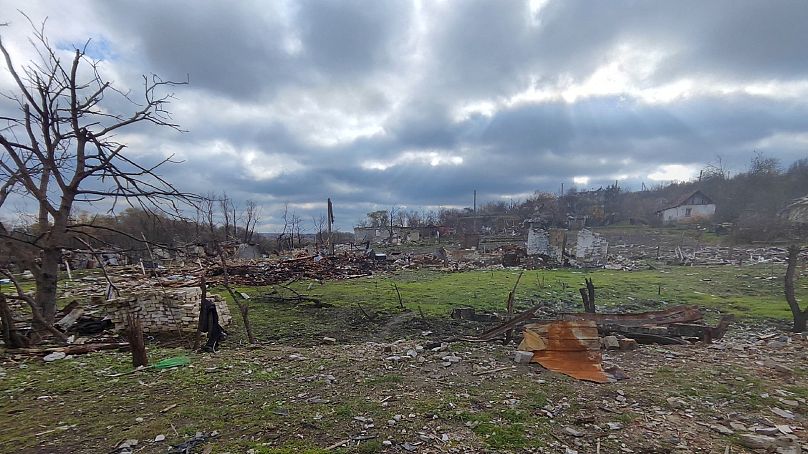The work does not stop with liberation, as Euronews found out when it went on patrol with Ukraine's security services in newly recaptured parts of the Kharkiv region.
The officer looked up at the sky. The last crunch of artillery fire was a bit too close. He dug his boots into the last of the autumn leaves decaying under him before turning his eyes -- and weapon -- back to the military vehicle he was guarding.
 ADVERTISEMENT
ADVERTISEMENT
 ADVERTISEMENT
ADVERTISEMENT
“What were you doing for Russia? Did you give the location of our soldiers' homes to the enemy,” a stern voice demanded from the back of a military vehicle.
The officer, from Ukraine’s Security Services (SBU), grew impatient: “We have information that you helped the Russians when they occupied this area, answer me!”
Finally, the man in tattered clothes and worn-out shoes barked back: “Why are you making problems?”
The officer, sporting a grey balaclava, tilted his head, amused: “So you are with Russia?”
“Historically Ukraine is Russian territory!”
The back and forth went on for some minutes ending in a frustrated grunt before the officers piled back into their vehicle and sped off.
“He was born in 1982, can you believe it?” the officer asked.
“Alcohol,” another replied.
“Fucking Vatnik”.
'We have to be careful'
These are the men tasked with managing Ukraine’s security, which, at this time, is a job of many faces in recently liberated parts of the Kharkiv region, close to the Russian border.
Fingers are being pointed and the atmosphere is paranoid. Neighbours report each other as the outside conditions chill, the sound of incoming fire as nerve-wracking as the impending winter.
Without electricity neighbours have set up tents outside soviet blocks to cook their food, water is gathered from a central point and the elderly people who remain drag heavy plastic buckets up flights of stairs.
Occasionally humanitarian aid packages are dropped to villages but the road is long and dangerous. Major sections of the regional capital Kupianyask are flattened.
This is life in Ukraine’s fraught east where a scramble for resources and paranoia reign. Those who stood with Ukraine while under occupation were living side by side with their neighbour who welcomed the Russians. It’s a messy picture and SBU is trying to define the lines.
Anton*, an SBU officer from Kyiv who has been working in Kharkiv since April, painted a grim picture
“People were paid very little money to help the Russians but some also did it willingly," he told Euronews. We have different ways of gathering intelligence and when we have something solid we can act.
"Now, since liberation we get a lot of human intelligence which is not always reliable, neighbours who have problems with each other can try to settle scores so we have to be careful,” he said.
“We are working both inside and outside the frontline. We are dealing with counter-insurgency work in our own territory, and working with our partisans on the other side. On top of this, we are fighting a war. It’s every kind of war you can imagine here."
'Those people are so stupid'
Meanwhile, on the main road back to Kyiv the group set up a checkpoint, phones are checked and anything suspicious is investigated. A businessman who worked close to the Russian border is frustrated.
“Why can’t we just make peace and get back to our lives!” he yells.
Anton says officers are warned about tone and behaviour when talking to potential Russian sympathisers.
“We start an investigation and see if they have broken a law and go from there. We have to work softly with people in the villages, we don’t want to drive them closer to Russia. It’s about winning hearts and minds now,” he said.
Often dismissed as Vatniks -- a derogatory term for separatists and Russian sympathisers in Ukraine’s Russian-speaking east -- loyalties here are often divided.
Andrei, a student from Kharkiv who stayed in the city throughout the war, said while most people stayed loyal to Ukraine some still believe Kharkiv is Russia.
“The Russians thought they would just roll into Kharkiv and we would welcome them. They got a surprise! There are still some old people who think about the Soviet Union. Those people are so stupid, I can’t stand them,” he said.
In the more pro-Russian villages close to the border -- where paintings of Lenin still hold pride of place -- the situation is more complex.
Russia broke many promises, civilians in Kupianyask who were promised salaries were often left unpaid, locals who went to Russia from Kharkiv Oblast were promised lives and salaries that never materialised. Despite this, some remain loyal to Moscow.
“Initially people I know that went there [Russia] complained but now they are so certain of their propaganda and the need to be right [that] they lie,” Andrei said.













